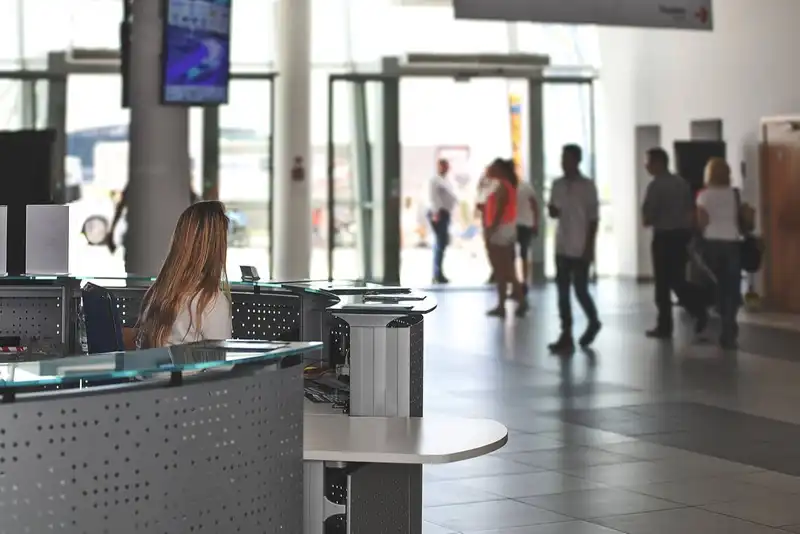What is a business security system?
A business security system is a comprehensive arrangement of tools and practices designed to protect a business's physical and digital assets. It typically includes surveillance cameras, alarm systems, access control, and cybersecurity measures, ensuring the safety of premises, data, and personnel.
Safeguarding Hospitality Guests and Assets with Business Security Systems
Hospitality Security
In the hospitality industry, the paramount importance of security cannot be overstated. It serves as the backbone of guest trust and business reputation. This industry, which thrives on providing comfortable and memorable experiences for guests, faces unique challenges in safeguarding both its patrons and assets. An effective security system in this sector is not just a precaution; it's a fundamental aspect of operational excellence.
The hospitality sector, encompassing hotels, resorts, and other accommodations, is inherently vulnerable due to its public nature. Guests from diverse backgrounds converge in these spaces, expecting not only comfort and service but also, critically, safety. The industry's obligation to provide a secure environment forms the crux of its promise to its clientele. This responsibility extends beyond the physical well-being of the guests to also encompass the protection of their personal information and belongings.
Security in hospitality is multifaceted. It's not merely about installing surveillance cameras or employing security personnel. It's about creating an environment where safety measures are seamlessly integrated into the guest experience. This integration must be skillfully executed so that security measures are effective without being obtrusive, maintaining the essence of hospitality comfort and relaxation.
Moreover, the dual focus on guest safety and asset protection is pivotal. While guest safety is about protecting individuals from physical harm and providing them with peace of mind, asset protection involves securing the business's physical and intellectual properties. This includes everything from the physical infrastructure to sensitive data such as guest information and financial records. The interplay between these two facets is delicate. Over-emphasizing one aspect over the other can lead to vulnerabilities and potential risks.
Implementing effective security measures in the hospitality industry, therefore, requires a balanced approach. It demands a strategy that not only addresses the immediate safety concerns of guests but also protects the broader assets of the establishment. Such a comprehensive security system underpins the trust that guests place in a hospitality service provider and is integral to the overall success and reputation of the business. In essence, robust security is not just a feature of the hospitality industry; it is its very foundation, critical to ensuring that guests feel safe and businesses remain protected.
Assessing Security Risks in Hospitality

Assessing security risks in the hospitality sector is a critical step in safeguarding both guests and the business. The unique environment of this industry, characterized by high guest turnover and extensive public access, presents a distinctive set of security challenges. Effective risk assessment is a proactive approach to identify potential vulnerabilities in both physical and digital realms, ensuring the implementation of adequate protective measures.
The first step in this process is identifying potential security threats. Physical threats may range from unauthorized access and theft to vandalism and physical violence. These risks are heightened due to the nature of hospitality settings, where guests and staff are in constant flux, and public areas are easily accessible. Hotels, resorts, and similar establishments must also consider risks associated with natural disasters, such as fires or floods, which can pose significant threats to both property and personal safety.
On the digital front, the hospitality industry faces threats like cyber attacks, data breaches, and fraud. These can stem from various sources, including external hackers and internal breaches. With the increasing reliance on digital systems for reservations, payments, and guest services, protecting digital data becomes as crucial as securing physical premises. This includes safeguarding guests' personal information, credit card details, and the integrity of online booking systems.
Conducting a risk assessment involves a thorough evaluation of the specific business environment. This process should be tailored to the individual property, taking into account its size, location, clientele, and the nature of services offered. A comprehensive risk assessment will evaluate potential entry points for physical threats, assess the effectiveness of existing security measures, and identify areas for improvement. Similarly, for digital threats, it involves scrutinizing the IT infrastructure, assessing data handling practices, and evaluating the robustness of cybersecurity measures.
A key aspect of risk assessment is not just identifying potential threats but also evaluating their likelihood and potential impact. This helps prioritize security efforts towards the most significant risks. For instance, a luxury resort might prioritize privacy breaches and property theft, while a city hotel might focus more on preventing unauthorized access and ensuring guest safety in emergencies.
Regularly updating the risk assessment is essential as new threats emerge and businesses evolve. This dynamic approach ensures that security measures remain relevant and effective in an ever-changing threat landscape. Overall, risk assessment in hospitality is an ongoing process, demanding vigilance and adaptation to effectively protect guests, staff, and assets in a complex and changing environment.
Integrate Camera Feeds with Staff Schedules
Enhanced Staff Coordination with Altametrics
Physical Security Measures
Physical security measures in the hospitality industry play a crucial role in safeguarding guests and the establishment's assets. The implementation of these measures is a delicate balance between ensuring safety and maintaining the welcoming atmosphere inherent to hospitality settings. Physical security systems, such as surveillance cameras and alarm systems, along with physical barriers and access control, are foundational elements in this security strategy.
Surveillance cameras serve as both a deterrent to potential wrongdoers and a tool for incident analysis. Strategically placed cameras monitor hotel lobbies, corridors, parking lots, and other vulnerable areas, providing real-time oversight and recording activities for future review if necessary. Modern surveillance systems are often equipped with advanced features like motion detection, night vision, and even facial recognition, enhancing their effectiveness.
Alarm systems in the hospitality industry are multifaceted, often including intrusion alarms, fire alarms, and emergency alert systems. These systems are designed to promptly alert staff and guests in case of unauthorized access or other emergencies, enabling a quick response to potential threats. Regular testing and maintenance of these alarm systems are essential to ensuring their reliability in critical moments.
Implementing physical barriers is another key aspect of physical security. This includes locks on doors and windows, safes in guest rooms, and secured areas for sensitive operations like cash handling or data storage. The choice of physical barriers should consider both the effectiveness in preventing unauthorized access and the ease of use for guests and staff.
Access control systems play a pivotal role in managing who enters and exits the property and sensitive areas within it. Keycard systems, biometric scanners, and coded access pads are common in modern hospitality settings. These systems not only restrict access to authorized individuals but also track entries and exits, adding an additional layer of security.
The best practices for implementing these physical security measures involve a comprehensive approach.
Integration - Ensuring that different security systems work in harmony and providing a cohesive security strategy.
Discretion - Implementing security measures in a way that is minimally intrusive to guest experiences.
Customization - Tailoring security measures to the specific needs and layout of the establishment.
Training - Ensuring that staff are well-trained in using and responding to the security systems.
Regular Updates and Maintenance - Keeping the security systems up to date with the latest technology and in good working condition.
Guest Awareness - Informing guests about security measures in place for their safety and enhancing their confidence and comfort.
Physical security measures, when implemented thoughtfully, not only protect guests and assets but also reinforce the reputation of the hospitality business as a safe and secure destination.
Digital Security and Data Protection
In today's digital age, the hospitality industry's reliance on technology for operations and guest services necessitates a robust approach to digital security and data protection. The importance of cybersecurity in this sector cannot be overstated, particularly in safeguarding sensitive guest data and ensuring the security of online transactions.
The digitalization of guest interactions, from online reservations to digital check-ins and payment processing, has significantly enhanced convenience and efficiency. However, it also opens up new vulnerabilities. Cybersecurity in the hospitality industry is critical for protecting guest data, which often includes personal information, payment details, and travel plans. A breach in data security can lead to significant financial losses, damage to the establishment's reputation, and erosion of guest trust.
Protecting digital networks and databases requires a multi-layered security strategy. This involves deploying firewalls, antivirus software, and intrusion detection systems to safeguard against external threats. Regular software updates and patches are crucial to address vulnerabilities and protect against new types of cyber attacks. Encryption of sensitive data, both at rest and in transit, further ensures that guest information remains confidential and secure.
Strategies for securing digital networks also encompass rigorous access controls. Limiting access to sensitive data to authorized personnel only and employing strong authentication measures are essential practices. This approach reduces the risk of internal breaches and unauthorized access.
Training staff in cybersecurity best practices is another key aspect. Employees should be aware of the latest phishing scams and social engineering tactics used by cybercriminals. Regular training sessions can help staff recognize suspicious activities and understand the correct protocols for reporting and responding to potential security threats.
Beyond reactive measures, proactive monitoring and regular security audits are vital. These audits help in identifying potential security gaps in the digital infrastructure and in evaluating the effectiveness of current security measures. Such continuous assessment and improvement are crucial in an ever-evolving digital threat landscape.
Staff Training and Security Protocols

The role of staff in maintaining security within the hospitality industry is paramount. They are often the first line of defense against security breaches and play a critical role in ensuring the safety and well-being of guests. Consequently, effective training in security protocols and emergency response is essential for fostering a secure environment.
Staff training in security protocols begins with comprehensive onboarding sessions. These sessions should cover the establishment's specific security policies, the use of security equipment, and the recognition of potential security threats. Regular refresher courses are also vital to keep staff updated on new security measures and changes in protocols.
Emergency response training is another crucial component. Staff should be well-versed in the procedures for various emergency scenarios, such as fire, medical emergencies, natural disasters, or security threats like theft or violence. This training should include practical drills that simulate real-life situations, ensuring staff can react swiftly and efficiently in a crisis.
The effectiveness of training methods is significantly enhanced by interactive and engaging approaches. Role-playing exercises, for instance, can help staff better understand how to handle challenging situations, such as dealing with unruly guests or responding to a security alarm. Interactive workshops and scenario-based learning sessions encourage active participation and help staff retain crucial information.
Another key aspect is training staff to be observant and proactive in identifying potential security risks. This includes recognizing suspicious behavior, understanding how to properly report incidents, and being aware of their surroundings at all times. Emphasizing the importance of vigilance and proactive risk management is essential in creating a culture of security awareness.
In addition to on-site training, online modules and e-learning platforms can provide staff with flexible and accessible training options. These platforms can offer a range of resources, from instructional videos to quizzes and interactive simulations, allowing staff to engage with the material at their own pace. Lastly, involving senior management in security training underscores its importance to the entire organization. When leadership is engaged in and committed to security training, it sends a clear message about the organization's dedication to maintaining a safe and secure environment.
Real Time Surveillance both Indoors and Outdoors
Ensure Guest Safety and Operational Efficiency with Altametrics
Guest Communication and Safety Information
In the hospitality industry, guest communication and the dissemination of safety information are pivotal components of a comprehensive security strategy. The challenge lies in conveying necessary security measures to guests without causing alarm or discomfort. Achieving this balance requires tactful and effective communication, ensuring guests are informed, prepared, and reassured about their safety.
The first step in this communication process is to integrate safety information into the standard guest orientation. Upon check-in, guests can be subtly informed about the security measures in place. This could include information about emergency exits, the location of first aid kits, or the availability of 24-hour security assistance. The key is to present this information as part of the establishment's commitment to guest comfort and safety, rather than as a response to potential threats.
Good communication is also essential when providing safety information in guest rooms. Information booklets or digital guides can detail safety protocols, emergency procedures, and contact numbers for security personnel. This method allows guests to familiarize themselves with safety measures at their own pace and without undue stress.
Signage plays a crucial role in communicating safety information discreetly yet effectively. Strategically placed signs can guide guests to emergency exits or inform them of security practices, such as surveillance in public areas. The design of these signs should be clear and concise, blending with the hotel's aesthetic to avoid creating a sense of foreboding.
Training staff in effective communication techniques is also crucial. They should be adept at answering guests' security-related queries in a manner that is reassuring and informative. Staff should also be trained to recognize situations where guests might need additional information or assistance regarding security measures.
Incorporating technology can further enhance guest communication. Mobile apps or SMS services can be used to update guests about security-related matters in real-time, such as changes in access codes or reminders about safe practices.
Finally, feedback mechanisms should be in place to gauge guest reactions to the security information provided. This can help in refining the approach, ensuring that the communication of safety measures is always guest-centric, reassuring, and effective.
Regular Security Audits and Updates
Regular security audits and updates are essential practices in the hospitality industry, playing a crucial role in maintaining and enhancing the security of guests and assets. In an environment where threats can evolve rapidly, staying ahead with proactive and continuous assessments is vital for ensuring the effectiveness of security measures.
The importance of regular reviews lies in their ability to identify potential vulnerabilities before they can be exploited. These audits involve a thorough examination of both physical and digital security infrastructures. For physical security, this might include checking the functionality of surveillance cameras, testing alarm systems, assessing the integrity of locks and access controls, and evaluating the effectiveness of staff security training. In the digital realm, audits scrutinize firewalls, anti-virus systems, network security protocols, and data encryption practices.
These evaluations should not be a one-time activity but a regular part of the security management process. Scheduling periodic audits allows for the timely detection of weaknesses and the opportunity to rectify them before they become critical issues. It also helps in ensuring compliance with any legal and regulatory requirements pertaining to security in the hospitality sector.
Incorporating feedback into the security update process is another crucial element. This feedback can come from various sources, including staff observations, guest comments, and findings from previous security incidents. Such insights provide a practical perspective on how security measures are functioning in day-to-day operations and how they can be improved.
The integration of new technologies is also a key aspect of updating security measures. The field of security technology is continually advancing, offering new solutions that can enhance safety and efficiency. For instance, advancements in artificial intelligence and machine learning can bring about more sophisticated surveillance and data protection systems. Biometric security measures, such as fingerprint or facial recognition systems, can provide more secure and convenient access controls. However, integrating new technologies should be approached with caution. It requires careful planning to ensure compatibility with existing systems and consideration of any potential privacy concerns, especially when it comes to guest data.
Balancing Hospitality with Security
The hospitality industry thrives on providing exceptional guest experiences, a mission that is deeply intertwined with the assurance of security and safety. The concluding focus of any discussion on hospitality security is the delicate balance between maintaining an inviting atmosphere and implementing effective security measures. This balance is not just crucial for guest satisfaction but also for the overall success and reputation of the hospitality business.
Effective security is fundamental in enhancing the guest experience. When guests feel safe and secure, they are more relaxed and able to enjoy the amenities and services offered. Security measures, therefore, should not be seen as mere obligations or responses to potential threats, but as integral components of the guest service package. A well-secured environment contributes to a sense of wellbeing and comfort, which is at the heart of what the hospitality industry aims to provide.
The ongoing nature of security management in the hospitality sector cannot be overstated. It's a dynamic process that requires constant vigilance, regular updates, and adaptability to emerging threats and technologies. As the risks and technologies evolve, so must the strategies and measures employed to counter them. This evolution is not just about loss prevention or asset protection; it's about preserving the trust and confidence that guests place in the establishment.
A part of this ongoing process involves staying informed about global and local security trends, understanding the specific needs of the clientele, and continuously training staff to respond effectively to security incidents. It's also about listening to guest feedback regarding security measures and using this input to refine and improve practices.
In summing up, balancing hospitality with security is an art that requires careful consideration of how security measures affect the guest experience. It's about making guests feel safe without making the security measures obtrusive or overbearing. The aim is to create an environment where safety measures are seamlessly woven into the fabric of hospitality, enhancing the guest experience rather than detracting from it.
Transform Your Hospitality Management
Unparalleled Security and Efficiency with Altametrics












